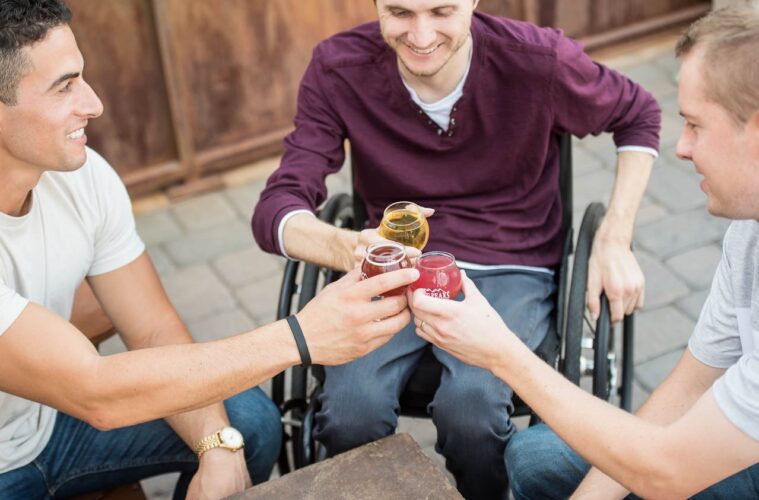Discovering new cities can feel like cracking open a novel; every street has its own narrative, and each corner reveals a new character. For disabled students, the story might require a bit more navigation, but it certainly doesn’t mean the adventure has to be any less thrilling.
This guide aims to equip you with practical tips and strategies for exploring new cities joyfully and safely, ensuring that your travels are rich in experience and light on stress.
Start with Research
Preparation is key. Before setting off, take some time to research your destination. Look for accessible attractions, restaurants, and accommodations.
Many cities offer detailed access guides that highlight barrier-free routes and facilities. Websites and forums such as TripAdvisor, Lonely Planet, and disability-specific resources can offer invaluable insights from other travellers’ experiences.
Use Technology
Technology can be your best ally in unfamiliar environments. Apps like Google Maps now feature accessibility options, showing routes that avoid stairs or steep inclines. Wheelmap is another excellent resource, cataloguing public places according to their accessibility.
Before you go, download the apps that cater to your specific needs, and don’t forget to save some offline maps just in case.
Connect with Locals
Reaching out to local communities can significantly enhance your travel experience. Social media groups and forums are great places to connect with fellow disabled students or locals who can offer advice on navigating the city. They can provide tips on the best times to visit attractions to avoid crowds or suggest hidden gems that are fully accessible.
Plan Your Transport
Understanding your transport options is crucial. Many cities around the world are making strides in public transportation accessibility. Check in advance for accessible public transit routes, taxi services with wheelchair ramps, or rental services for adaptive vehicles.
If you’re using a mobility scooter from a trusted supplier like Mobility Solutions, ensure that the city’s transport system can accommodate it, whether on buses, trains, or trams. This can greatly expand your exploration area without compromising on comfort or accessibility.
Remember, what works in one city may not work in another, so familiarise yourself with the local transport ecosystem.
Accommodation Matters
Choosing the right place to stay can significantly impact the quality and enjoyment of your travel experience. The comfort and accessibility of your accommodation can be the difference between a stress-free trip, and one filled with unnecessary challenges. When selecting where to stay, prioritise establishments that have clearly stated accessibility features and policies. This includes step-free access, elevators, wide doorways, accessible bathrooms, and, if necessary, room for mobility aids or equipment.
Consider the location of your accommodation carefully. Staying in a central, accessible area can reduce the need for extensive travel to visit attractions, dine out, or explore the city. However, quieter, more residential areas might offer more spacious accommodations with better accessibility features. Weigh the pros and cons based on your priorities and the nature of your trip.
Be Flexible and Patient
Exploring new places can sometimes present unexpected challenges. It’s important to approach your travels with flexibility and patience. Attractions may be closed for maintenance, or transport might run on a reduced schedule. Keeping a relaxed attitude will help you adapt to changes and find alternative activities that are just as enjoyable.
Safety First
Prioritise your safety by sharing your itinerary with friends or family. Keep a list of emergency contacts, including local emergency services and the nearest embassy or consulate, if you’re travelling abroad. It’s also wise to have a basic first aid kit and any necessary medications readily available.
Seek Out Accessible Activities
Many cities offer activities specifically designed with accessibility in mind. From guided tours with sign language interpreters to sensory-friendly museum hours, there’s a growing recognition of the need for inclusive entertainment options. Researching these activities beforehand can provide a fulfilling and hassle-free experience.
Embrace Local Culture
Immersing yourself in the local culture is what makes travelling so enriching. Look for accessible cultural experiences, whether it’s a cooking class, a concert, or a craft workshop. Participating in local traditions and engaging with the community can provide a deeper understanding and appreciation of the places you visit.
Document Your Journey
Finally, consider documenting your travels. Sharing your experiences through a blog, social media, or videos can inspire other disabled students to explore new cities. Your insights can also contribute to improving accessibility and inclusivity in travel, making the world a more navigable place for everyone.
Exploring new cities as a disabled student offers a unique opportunity to engage with the world in profound and meaningful ways. With the right preparation and a spirit of adventure, you’ll find that the narratives of new places are open to you, full of characters and stories waiting to be discovered.
So pack your bags, charge your tech, and prepare for an exploration filled with joy, learning, and unforgettable memories.



